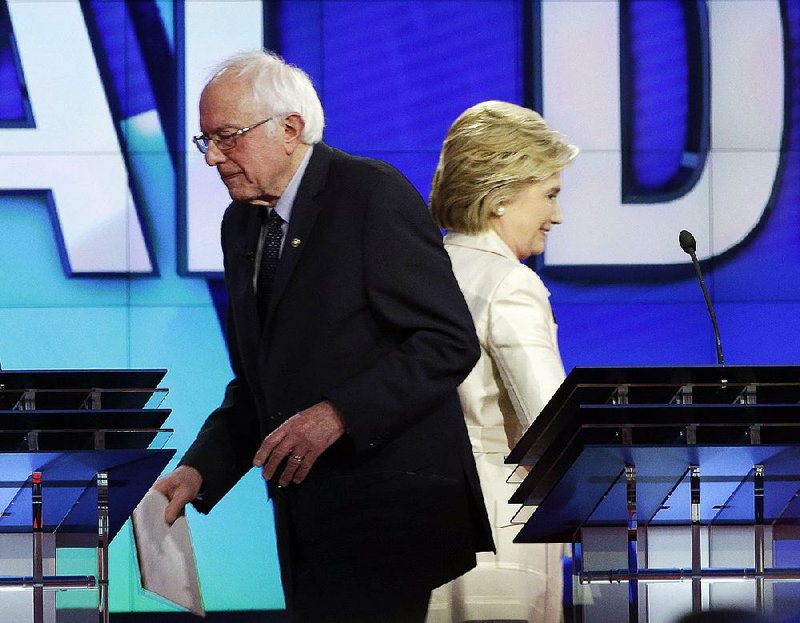NEW YORK -- Hillary Clinton and Bernie Sanders challenged each other's judgment to be president in Thursday night's Democratic debate, wrangling over Wall Street banks, the minimum wage and gun control.
FULL ELECTION COVERAGE
RELATED ARTICLES
http://www.arkansas…">Party, Clinton to sue Arizonahttp://www.arkansas…">For Trump manager who grabbed arm, no charges
Sanders, a U.S. senator from Vermont, sought to chip away at Clinton's credibility. He cited her support for the Iraq War and for free-trade agreements, as well as her willingness to accept money through a super political action committee, as evidence that she lacks the judgment needed to lead the nation.
He went as far as to suggest that her labeling of certain criminals as "superpredators" when she was first lady was "a racist term and everybody knew it was a racist term."
Sanders backed away from previous statements questioning her qualifications, saying the former secretary of state does have the "experience and intelligence" to be president.
Asked to come up with an example of Clinton being influenced by the financial industry, Sanders gave Clinton an opening to defend herself when he couldn't point to a specific instance.
"He cannot come up with an example because there is no example," Clinton said. "It may be inconvenient but it's always important to get the facts straight."
Earlier, Clinton had apologized for the "unintended" consequences of that push for tougher sentences, which has been blamed for an increase in the incarceration rates of black people.
"I'm sorry for the consequences that are unintended and have had a very unfortunate impact on people's lives. I've seen the results," Clinton said. "I want to focus the attention of our country, and to make the changes we need to make. I want white people to recognize that there is systemic racism. It's also in employment, it's in housing, but it is in the criminal-justice system."
Clinton made little effort to hide her irritation with Sanders' challenging of her qualifications, saying that while she has been "called a lot of things in my life, that was a first." She repeatedly linked herself to President Barack Obama, who remains popular among Democrats, suggesting Sanders' criticism of her amounted to condemnation of the president.
"I think you need to have the judgment on day one to be commander in chief," she said.
She also cast Sanders as unprepared to implement even his signature policy proposals, including breaking up big Wall Street banks. And she chided Sanders for chuckling during an exchange on gun control, an area where she has painted him as cozy with gun dealers and manufacturers.
At one point, Sanders laughed at a mention of an attack line from Clinton, that Vermont is the largest per-capita source of guns used in crimes in New York. The actual number of guns traced to Vermont is relatively small, but the state's small population makes the per-capita number high. Sanders chuckled at the argument, but Clinton interjected.
"It's not a laughing matter," she said, dodging the question about whether the per-capita statistic had been fair. "I take it really serious. Because I have spent more time than I care remember being with people who have lost loved ones" to gun violence.
Sanders defended his record, saying he got poor marks from the National Rifle Association, and his vote against a measure that would make firearms manufacturers and dealers liable for gun crimes.
The debate was the first for the Democratic candidates in five weeks. It came ahead of Tuesday's primary in New York, a high-stakes contest with 291 delegates at stake. It is the biggest prize of the Democratic race so far.
For Clinton, a win in the state she once represented as a U.S. senator would blunt Sanders' recent momentum and put his pursuit of the nomination further out of reach. A Sanders victory in the state where he was born would shake up the race, giving him a needed boost in the hunt for delegates.
The Democratic primary has been fought for months on familiar terrain. Clinton has cast Sanders' proposals for breaking up banks and offering free tuition at public colleges and universities as unrealistic. Sanders has accused Clinton of being part of a rigged economic and political system, hammering her repeatedly for giving paid speeches to Wall Street banks and refusing to release the transcripts.
Clinton struggled to explain why she has not released the transcripts, saying only that she'll do so when other candidates are required to do the same thing. Sanders countered that he's given no speeches to release.
Instead, Clinton tried to raise questions about Sanders' own openness for not releasing his income taxes.
The senator pledged to release his most recent tax returns today and said there would be "no big money from speeches, no major investments" in the disclosures.
The candidates also sparred over raising the federal minimum wage, with Sanders expressing surprise as Clinton voiced support for efforts to set the hourly pay rate at $15, the level he has long backed.
"I don't know how you're there for the fight for 15 when you say you want a $12 minimum wage," he said. Clinton then clarified that while she does support a $12 hourly minimum wage, she would sign legislation raising that level to $15.
Sanders, whose campaign has focused squarely on economic issues, showed more fluency on foreign policy than in previous debates, particularly during an extended exchange on the conflict between Israel and the Palestinians. He urged the U.S. to be "even-handed" in dealing with both sides and said Washington must acknowledge that Israel isn't right all of the time.
Clinton highlighted her involvement with Mideast peace efforts as Obama's secretary of state, saying pointedly, "Describing the problem is a lot easier than trying to solve it."
Sanders has won a string of recent primary contests, including a big victory earlier this month in Wisconsin. But because Democrats award their delegates proportionally, he has struggled to cut into the lead Clinton took earlier in the voting. He's also failed to persuade superdelegates -- the party insiders and elected officials who can back the candidate of their choice regardless of how their states vote -- to switch their loyalties from Clinton.
Clinton has accumulated 1,289 pledged delegates from primaries and caucuses while Sanders has 1,038. Her lead grows significantly when the superdelegates are added in: 1,758 for Clinton and 1,069 for Sanders.
It takes 2,383 to clinch the Democratic nomination.
Sanders has vowed to stay in the race through the party's convention in July. Backed by legions of loyal supporters, he has amassed impressive fundraising totals that give him the wherewithal to do just that.
After the New York primary, the next contests will be held on April 26 in five Eastern states: Connecticut, Delaware, Maryland, Pennsylvania and Rhode Island.
Home Turf
In the days leading up to the debate, Sanders has been unusually critical of the front-runner, questioning whether she was truly qualified to be president. Sanders cited Clinton's acceptance of Wall Street money, her past support of big trade deals, and her vote in favor of the Iraq War as evidence of her poor judgment. Sanders later backed off that comment, saying that "of course" Clinton was qualified.
Clinton has cast Sanders as an idealist whose signature policies -- including government-paid college tuition and government-run universal health insurance -- would be legislatively and logistically unworkable. In recent days, she has focused on a difficult interview that Sanders had with The New York Daily News editorial board, in which Sanders struggled with questions about his own plan to "break up" big banks.
On Thursday, Sanders condemned remarks by a warm-up speaker at a huge Sanders rally in Manhattan the day before. Paul Song, the executive chairman of the progressive Courage Campaign, had labeled establishment Democrats in Congress as "corporate Democratic whores," who ought to be defeated and replaced by "Berniecrats."
"There's no room for language like that in our political discourse," Sanders wrote on Twitter.
Both candidates can claim New York as home turf.
Sanders was born in the Brooklyn borough of New York. Clinton, an Illinois native, represented New York for eight years as a senator and put her presidential campaign headquarters in Brooklyn.
Clinton has led consistently in polls of New York Democrats, but in recent weeks Sanders seems to have cut into her lead. In late March, some polls had her 30 points ahead in New York. More recently, her lead has been between 10 and 13 points.
Information for this article was contributed by Julie Pace and Catherine Lucey of The Associated Press; by David A. Fahrenthold and John Wagner of The Washington Post; and by Jennifer Epstein, Arit John, John Follain, Margaret Talev and Sahil Kapur of Bloomberg News.
A Section on 04/15/2016


